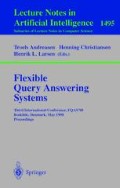Abstract
The well-founded semantics has been introduced for normal databases (i.e. databases that may have default negation in their rule bodies, but do not have disjunctions). In this paper we propose an extension of the well-founded semantics to the disjunctive case. For this purpose we investigate the alternating fixpoint approach of Van Gelder, Ross and Schlipf [16], and develop a suitable generalization to the case of disjunctive rule heads.
Given a disjunctive database P, the new alternating well-founded semantics derives a set Adwfs p of partial Herbrand interpretations of P. This set coincides with the set of minimal models if there are no default negations in the database. For general disjunctive databases it is always not empty (if all rule heads are non-empty), i.e. Adwfs p is consistent. The alternating well-founded semantics is very useful for query answering in disjunctive databases. During a fixpoint computation the final set Adwfs p is approximated by a sequence (I n )n∈∕0 of sets I n of partial Herbrand interpretations. At any step of the fixpoint computation it holds: If the query already holds in I n then the query will also hold in Adwfs p, and the computation can be terminated.
For other semantics like the semantics of stable and partial stable models, so far no computations are known that have this property.
Preview
Unable to display preview. Download preview PDF.
References
S. Brass, J. Dix: Characterizations of the Disjunctive Stable Semantics by Partial Evaluation, Proc. Third Intl. Conf. on Logic Programming an Non-Monotonic Reasoning (LPNMR'95), Springer LNAI 928, 1995, pp. 85–98, and: Journal of Logic Programming, vol. 32(3), 1997, pp. 207–228.
T. Eiter, N. Leone, D. Sacca: On the Partial Semantics for Disjunctive Deductive Databases, Annals of Mathematics and Artificial Intelligence, to appear.
B.A. Davey, H.A. Priestley: Introduction to Lattices and Order, Cambridge University Press, 1990.
M. Fitting: Bilattices and the Semantics of Logic Programs, Journal of Logic Programming, vol. 11, 1991, pp. 91–116.
M. Gelfond, V. Lifschitz: The Stable Model Semantics for Logic Programming, Proc. Fifth Intl. Conference and Symposium on Logic Programming (ICSLP'88), MIT Press, 1988, pp. 1070–1080.
M. Gelfond, V. Lifschitz: Classical Negation in Logic Programs and Disjunctive Databases, New Generation Computing, vol. 9, 1991, pp. 365–385.
J. W. Lloyd: Foundations of Logic Programming, second edition, Springer, 1987.
J. Lobo, J. Minker, A. Rajasekar: Foundations of Disjunctive Logic Programming, MIT Press, 1992.
T.C. Przymusinski: On the declarative semantics of Deductive Databases and Logic Programming, in: Foundations of Deductive Databases and Logic Programming, J. Minker ed., 1988, pp. 193–216.
T.C. Przymusinski: Extended Stable Semantics for Normal and Disjunctive Programs, Proc. Seventh Intl. Conference on Logic Programming, 1990, pp. 459–477.
T.C. Przymusinski: Stable Semantics for Disjunctive Programs, New Generation Computing, vol. 9, 1991, pp. 401–424.
D. Seipel:DisLog — A Disjunctive Deductive Database Prototype, Proc. Twelfth Workshop on Logic Programming (WLP'97), 1997, pp. 136–143. DisLog is available on the WWW at ”http://www-infol.informatik.uni-wuerzburg.de/databases/DisLog”.
D. Seipel, J. Minker, C. Ruiz: Model Generation and State Generation for Disjunctive Logic Programs, Journal of Logic Programming, vol. 32(1), 1997, pp. 48–69.
D. Seipel, J. Minker, C. Ruiz: A Characterization of Partial Stable Models for Disjunctive Deductive Databases, Proc. Intl. Logic Programming Symposium (ILPS'97), MIT Press, 1997, pp. 245–259.
D. Seipel: Partial Evidential Stable Models For Disjunctive Databases, Proc. Workshop on Logic Programming and Knowledge Representation (LPKR'97) at the International Symposium on Logic Programming 1997 (ILPS'97), 1997.
A. Van Gelder, K.A. Ross, J.S. Schlipf:, Unfounded Sets and Well-Founded Semantics for General Logic Programs, Proc. Seventh ACM Symposium on Principles of Database Systems, 1988, pp. 221–230.
C. Witteveen, G. Brewka: Skeptical Reason Maintenance and Belief Revision, Journal of Artificial Intelligence, vol. 61, 1993, pp. 1–36.
J.H. You, L. Y. Yuan: Three-Valued Formalisms of Logic Programming: Is It Needed?, Proc. Ninth ACM Symposium on Principles of Database Systems (PODS'90), 1990, pp. 172–182.
Author information
Authors and Affiliations
Editor information
Rights and permissions
Copyright information
© 1998 Springer-Verlag Berlin Heidelberg
About this paper
Cite this paper
Seipel, D. (1998). An alternating well-founded semantics for query answering in disjunctive databases. In: Andreasen, T., Christiansen, H., Larsen, H.L. (eds) Flexible Query Answering Systems. FQAS 1998. Lecture Notes in Computer Science, vol 1495. Springer, Berlin, Heidelberg. https://doi.org/10.1007/BFb0056015
Download citation
DOI: https://doi.org/10.1007/BFb0056015
Published:
Publisher Name: Springer, Berlin, Heidelberg
Print ISBN: 978-3-540-65082-9
Online ISBN: 978-3-540-49655-7
eBook Packages: Springer Book Archive

